#the young storytellers 2016
Text
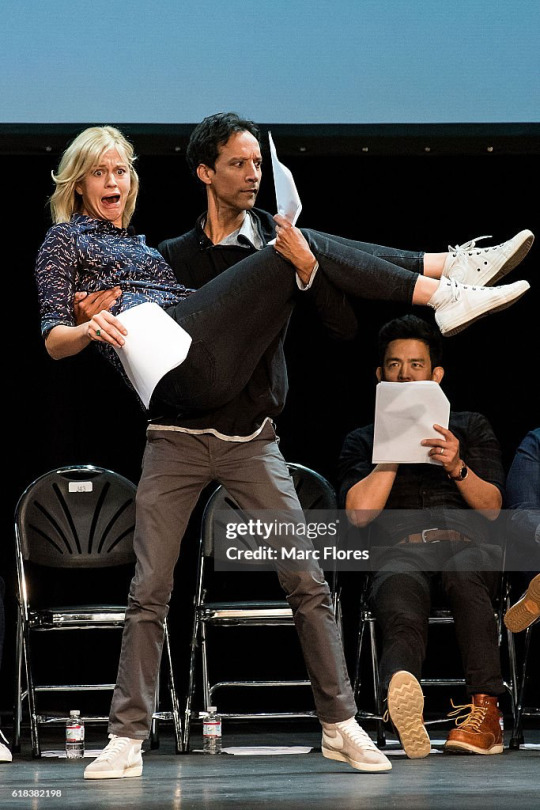
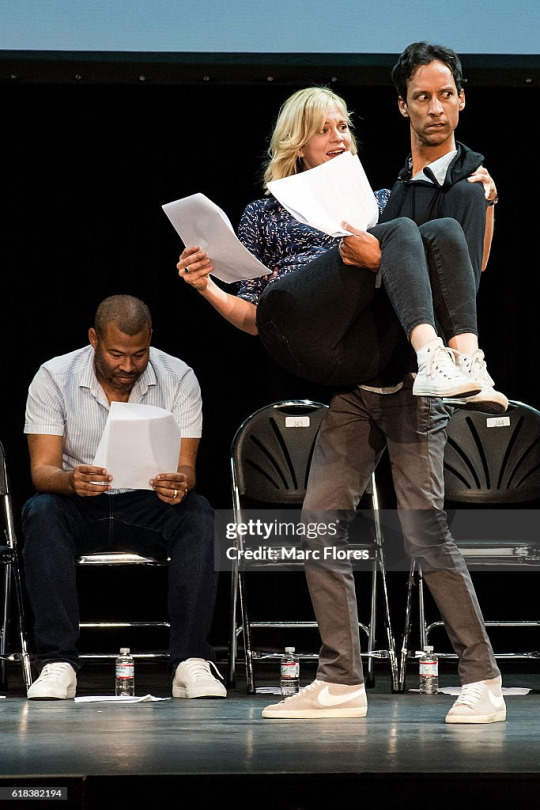
12 notes
·
View notes
Text
a doctor turned serial killer turned doctor again, an actor who paints, a gang leader, a mining baron, and a vice overseer walk into the room.
oh yeah and they lead karnaca now.
dishonored 2 is my fav game but i think it's mid, story-wise. here's why dh1 works and why dh2's overarching story sorta misses
tl;dr: story integration is critical for gameplay that offers audience payoff, but emily's personal arc from dishonor to honor is inconsistently demonstrated in the story, and is not an interactive part of the gameplay.
essay/long version under cut >
recap: what's dishonored's deal
[skip if you want]
dh1 is an underdog story: corvo is an honorable man swept up in the machinations of a callous city, so his canonical ending being 'this child will rule over an empire' isn't about the child's rule but rather about corvo's reputation being restored in a more hopeful city, due to his & the player's rejection of the violent connotations of the tagline 'revenge solves everything.'
similarly, in dh1 DLCs, daud's story arc is that of an anti-hero: a dishonorable man who realises too late he has done irreparable harm. he sees the error of his ways after a single monumental death, and eventually a single life redeems him when he/the player stepped in to circumvent a terrible fate for a child, enabling her to rule unfettered.
daud & corvo come to a satisfying conclusion within the extent of their narrative arcs. it doesn't matter that a child on a throne isn't really a fix for a decaying empire - the player's actions throughout the city of dunwall was what mattered - and these stories could be framed as parables. in that sense, young emily as a ruler is a metaphor for a hopeful future for the city & empire.
dishonored 1 & its DLCs are also great examples of storytelling with perfectly integrated gameplay - you, the player, worked towards the outcome that redeemed the protagonists.
in your efforts to save young emily, you either achieved a good outcome (corvo) or prevented a worse outcome (daud).
bringing us to dh2 -
what's emily's arc
emily's arc is a coming of age: we're introduced to a reigning empress who questions her role & skillset ("am i the empress my mother wanted me to be?"), then her titular fall from grace occurs. from there, she learns to reject the violent, selfish connotations in 'take back whats yours' tagline (a la daud & corvo!) while rediscovering why her rule is critical to the empire.
emily's rule is no longer metaphorical, but:
a literal thing for audience assessment (is emily a good ruler?) AND
the crux of her storyline.
at the beginning of dh2, emily is introduced as a disengaged leader ("i wish i could just run away from all this;" "i dont know if whether i should sail to the opposite side of the world, or have everyone around me executed"). the antihero has a precedent for the dishonored series in daud, so it's not at first glance an issue*, however, the fact that emily has ruled poorly reframes corvo & daud's endings as being less than ideal (a moralistic retcon) *we could talk here about how ready an audience was in 2016 for a flawed women as a protagonist, hell, even in 2023,,,
throwback to the beginning of this essay when i said:
'this child will rule over an empire' isn't about the child's rule but rather about corvo's reputation
emily's story arc, unlike for daud & corvo, is literally about the quality of her rule. we're no longer in metaphor territory (ironic phrase): a parable-style ending doesn't work.
does emily become a good ruler
we know she becomes a good ruler because the game says so. it is narrated to the audience via a (literal) word of god in the space of 30 seconds, after the final boss. the outsider tells us that emily becomes known as Just & Clever.
drawing a distinction here - this narration is not the same as the player actively being involved.
the player does not throughout the game become aware that emily has made political allies. during the game, she doesn't talk to these characters about saving karnaca or being a better ruler to the empire (there's a few lines might imply it, but you need to be actively looking and being careful to wait for every voice line. it's a far cry from daud & corvo's fight to save emily being unmissable - even though daud doesn't know at the beginning that's the goal).
how does the game show it
you can coincidentally not kill most of your subjects and never be aware that emily is looking to restore karnaca by means of instating a council - it's never brought up. it *couldn't* be brought up, because that council serves under the fake duke (armando), who is the last person she speaks to before she leaves for dunwall. its her suggestion that he rules karnaca, but armando's condition is that he will rule as he sees fit.
to back up a bit, emily's canonical method of restoring karnaca is by banding together key allies - hypatia, stilton, [byrne &or paolo], pastor, under a council beneath the duke's body double. they are passionate people who would each individually make worthwhile advisors, but if you think about those characters sitting at a table trying to reach an agreement, it feels like an assortment of people that emily didn't kill along the way and doesn't feel organic (up to interpretation). it's not stated if emily herself banded this council together, but logically she must have (worth a mention these are mostly characters that you as the player had reasonable rationale to kill during a high chaos run, except pastor). the underlying concept may be that karnaca's power is returned to its people - which is interesting given that the monarchy remains and armando's decision is final.
this overarching solution could also be taken as a critique to dh1's 'put your kid on the throne,' which is another reason its worthwhile looking at how emily was shown to be a better leader. obviously my point isn't that her solution was bad given the circumstance, but i mean she has very little agency here in all. if emily was shown to be more controlling as a leader, this could be interpreted as character growth, but that's not the case.
coming of age
how do you learn & grow when you can't specify your failings? emily doesn't really touch on her shortcomings as an empress. she non-specifically worries delilah makes a better empress than her. it's hard to argue her worries are meaningful when someone good at their job will still worry when lives are in the balance.
emily's best 'aha' moments (eg. crack in the slab comment about gaining perspective) are consistently undercut by a conversation with sokolov or meagan afterwards in which she demonstrates she hasn't learned anything (before the grand palace, emily condemns 'toadies sucking up to me' and is reminded by meagan that she's part of the problem). the story is confused about what it's trying to say about emily's progress, and when she's meant to show progress, if she was meant to show any progress at all. it could be argued that emily was never even a bad ruler, she had just been fed misinformation about the problems in karnaca and been the victim of slander by her political enemies. the game doesn't make this clear - it's easier to argue that the opposite is true given that her allies only have criticism.
worth a mention here that the heart quotes about armando - a fake ruler - interestingly mirror emily's character concerns. "see how he sighs? his life is a gilded cage." but this essay is already long.
while corvo & daud spend their games (and through the gameplay) 'earning' their redemption, emily is being led by the NPCs around her to a conclusion and a fix for the political mess in karnaca: meagan & sokolov guide emily to her missions, and there's no recurring quest for emily to investigate possible allies. she is able to gather the people she hasn't killed to herself by manner of... post-game narration. during the game, she's primarily concerned with getting her throne back.
an easy fix: if there had been less dialogue & narrative focus on emily's failings perhaps the ending would have felt more satisfying. it has the feel of cut content, but i don't know what was cut to be able to comment on it.
so what went wrong?
i can't help but wonder if arkane were worried they would lose a certain demographic if corvo wasn't playable (may have been deemed too much of a risk - 2013 was a different time), and so they had to take out story elements that were unique to emily's growth as a character/empress, because the usual storyline/gameplay integration had to work for both characters - in other words, gameplay that made sense for both corvo & emily was prioritised before emily's story & character development. which is a silly problem to have in a game that added character voices for the sake of improving characterisation - maybe emily's tale would have felt more akin to a parable if she had less lines that betrayed her ignorance (to the disdain of those around her).
i wish more care had been taken with emily's story. most players will never really notice the large variety of different endings - they're not particularly satisfying in and of themselves.
it's ironic that one of Emily's complaints is about her father/protector being overbearing, when his (parallel universe) presence in the gameplay may be one of the reasons her own narrative arc falls flat.
what are the upsides here
changing tune from what didn't work - don't you think the concept is fantastic? it's a great idea overall - can you imagine if the coming of age storyline was better integrated into the game?
it's valuable to talk about the integration of story and gameplay and characterisation from a craft perspective. dh2 genuinely is my favourite game - it's beautiful, the imm-sim design philosophy makes the world a delight to explore, the combat gives endless creative options for tackling any fight, there is a far greater diversity of cast in an in-text canonical way. there's loads to love!
i love emily as a dodgy leader, to me it adds interesting dimensionality to the outsider's narrations - of course in dunwall there's never a neat happily ever after! emily, like the outsider, both work well as characters who hold ultimate power but aren't necessarily worthy of it - and this makes perfect sense for the dishonored universe's morality & critiques of power. however, within this grey area there's still plenty of room for a satisfying ending, which isn't what we ended up with, whatever the true reason for that was. and also, damn, emily's a marked assassin empress, if she can't lead well then who can?
while dh1 was criticised for its narrative simplicity, dh2 in contrast and in hindsight shows us that simplicity isn't so bad - there's satisfaction in gameplay achieves a clear, simple narrative goal.
#are you a dh1 enjoyer but less so a dh2 enjoyer?#have you ever wondered why you don't love dh2 as much?#here's 1.8k words that might articulate some of that.#light reading.i guess#this essay wasn't meant to cover everything - just the core of the plot and why its important to integrate story & gameplay#and to compare dh1 & 2#dishonored#dishonored 2#dishonored 2 spoilers#emily kaldwin#daud#corvo attano#this week i'm cracking things out of my drafts!#<333 don't get me started on doto.#some of this might be contentious. idk i try to live in a bubble#the meme version was easier to read i know i know#this essay would have been a lot longer had i integrated more references from the game#i know a few others have said this but imagine if they went a different way with emily#like she realises shes not fit for the job and maybe no one is and says fuck the system cause shes got a rebellious streak#and does a kickflip on the monarchy and institutes something else. i dont even care what. make it funny#and then for the sake of continuing the trend we spend dishonored 3 undoing the horrible leadership emily instates <3#i think they really loved emily as a character. i FEEL the love i believe its there.but didn't think enough bout how she would be perceived#there's a good couple comments from baldur's gate 3 devs about how much work goes into writing women to account for sexism#there's more that i could have added to this essay but for brevity's (ha.ha) sake i'll leave it there#other textposts about this game that i see around tend to romanticise dishonoreds story a little more
82 notes
·
View notes
Text
get to know my favorite driver's ship
this was made by me and for me and i wrote fanfic about them!!!
(fyi; i started watching f1 in 2015 so ofc you guys KNOW what my FIRST and ULTIMATE ship)
(older f1 ships: )
Brocedes :D (childhood friends, teammates, rivals, anything but a lover - crofty 2021)
OH COME ON. I will write an essay about their history. BUT ANYWAY, despite their toxic year in 2015/2016, I still adore how young nico and lewis friendship or whatever they had in Greece back then and I still keep this ship alive until the 2021 season. Their battle on the track was BEYOND TOXIC, yet their battle off the track (media drama) is HILLAARIOUS. How come Lewis accidentally spills out, the name that shouldn't be spoken for Half of DECADE. God both of them are dramas king. NICO PODCAST omg the talk with Alain prost and they compared his vs Senna battle with HIS AND Lewis's battle PLUS when Nico's storytelling his "friendship" history in ITALY at the SPONSOR EVENTS *CRIED* and lewis always mentioned how he loves ice cream and do cheating day in imola and monza BECAUSE IT WAS NICO WHO INTRODUCE THE FOOD THERE. ugh I hate and love them at the same time. (I do include some Seb/NICO too because I like see Lewis getting rilled up)
2. Kimi and Seb (I ADORE THIS A LOT)
my calm and serenity wise iconic ferrari couple. I feel like Kimi was the rock ice and water for Seb to prevent him from burnout because of ferrari. during 2017-2018, Seb pushed hard (same like Charles) and yet the car reliability fuck his championship standing. and kimi (--kimi was the last ferrari champion hiks) kimi just so attentive to seb and I genuinely like both of them being rebels to whole ferrari tradition (like they don't do rollercoaster thingy, they DON'T master Italian, they just become their self and being so comfortable in their own bubble, fuck world). I had noticed also Seb (and Gio) is the only teammate that can make Kimi laugh. I just super super adore them!
3. Maxiel (TRADITIONALSHIP! I REFUSE OTHER SHIP FOR MAX BESIDE DANIEL. I REFUSE!)
ugh should I explain them? THE CHAOTIC GAYEST ENERGY IN WHOLEEE 2016 GRIDS COME ON. I love how Daniel basically took young rookie Max under his arm and just had fun on and off the track with It? The biggest flop was when Max was just so hotheaded and they crashed in Baku. I thought their relationship gonna be stranded but GUESS WHAT? MAXIEL IS STILL ALIVE UNTIL NOW HELLO? and their relationship is so real not only for the camera but also out the camera. The other highlight moment is when Max is already 'too big' daniel really steps down from RBR because he knows, Max will outshine him, and he knows (what he learned from brocedes too) that it's better to go the other way.
(newer)
4. Dando (COMFORT SHIIP Not romantically also)
I thought daniel was max soulmate but LANDO excuse me? They can share daniel If they want. i just love how lando becomes so silly and blushes like school teenager around Daniel. i love how they INFLUENCE each other. I think because I feel nostalgic with them because they really similar with Maxiel in 2017 era, just one season before Daniel goes to renault, Maxiel was strained on thin paper. Dando other hands, well Daniel mostly, struggled in McLaren (with the papaya fans also still adore Carlos that time and refuse to let go him) plus Lando was shining bright just like Max 2016. Again, daniel he stepped OUT (this time). I guess, that similarity made me miss maxiel too.
5. last one C2 (Charlos) gosh, please!! ultimate!!!
loving and adoring them was expected though. It wasn't because they're both handsome (I already know Carlos was goofy ever since his Renault era so I never consider him as a handsome man) BUT DANG BOY, RED ON CARLOS WAS SOMETHING ELSE? RED ON CARLOS, BLACK ON CARLOS WAS SAKDAJSKDFHLKJSAFHKJAF.
-- okay back to the c2. It was a slow build okay? I realized that they are special during Carlos's first podium, Monaco 2021. Charles WAS LIKE ME. Blushing giggling, shy gazes toward Carlos. they are so endearing. Both of them are the victims of the Ferrari team. But I think they both understand each burden (Charles being the predestinated one, and Carlos had to prove his talent bcs he is a two times world champion son) plus, the way Ferrari screwed Charles in 2019. The team was cracked but with Carlos, I didn't expect this cursed team is heal :"D (Crying) and Charles become more relaxed, more enjoyed, even his coping mechanism is with laughter and Carlos just matches his energy. Idk , they gave me... a relationship through ups and downs.
and I realized there are so many people trying to pit them against each other, their fans are constantly arguing about who is the best and better driver, always dragging one of them down, but guess what is Carlos and Charles's response? it's completely differs from real life. They knew and fucking see it their fans tension. Carlos's anger to the Spanish media has already proven enough he had enough of these things. Charles also said in an interview that "what he saw about him and Carlos is nowhere true". they are the best PR relationship couple out there, but I also can see a genuine, how they know each other so weell. How Charles kept the football game updated just because of Carlos, how Carlos knows his favorite food, how they had their own internal jokes,
they are both soo lowkey on the camera during and outside the race. and I think that Is why people never hype them like carlando or everyone's favorite childhood rival to lovers lesttapen. And I thought they didn't really hang out with each other that much but WHAT WAS THAT SUMMER BREAK? HUH? YOU IN MALORCA AND WENT TO SOUTHERN FRENCH? What were the matching Instagram feeds color and aesthetic at New York? WHAT WAS THE THING ABOUT PASTA CARBONARA UN LUNGA NON PENNE? WHAT WAS THAT THING CHARLES SLEPT ON THE FLOOR just to accompany Carlos watching World Cup? The dolomites? The Sardinia?
there are soo many thing that they keep it so low-profile and under camera, and yet their conversation is so domestic.
#f1 drver#ships#brocedes#maxiel#simi#charlos#dando#charles leclerc#carlos sainz jr#lewis hamilton#nico rosberg#max verstappen#daniel ricciardo#i haven mention the rest of 2019 rookie also but yeah I'm too tired to write maybe in pt2#1655#c2#my rant
115 notes
·
View notes
Text
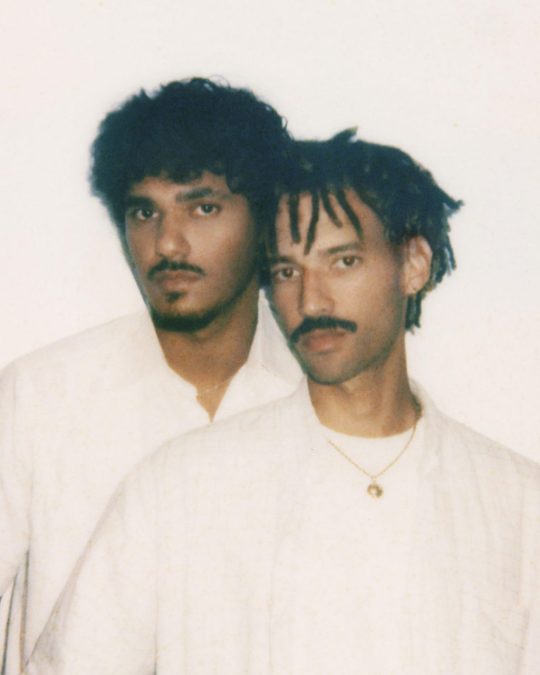
Photographers Mar + Vin ( Marcos & Kelvin )
Mar+Vin is a duo, formed by Marcos Florentino and Kelvin Yule. With backgrounds in Graphic Design and Journalism
MAR+VIN has contributed to a revolution in the way images are made in Brazil, adding artistic refinement to their photography to create stories that go beyond, while also playing an important role in the inclusion within the industry. Marcos and Kelvin often say that they are always looking for the "fantastic element" in the ordinary, creating powerful images with deep meaning and valuing their Brazilian roots.
Mar+Vin’s visual style is influenced by classical art with sculptural silhouettes and nods to symbolism, but they’re keen to incorporate local references from their Brazillian hometowns through locations and colour palettes.
Marcos was born in the state of Piauí, in a small village in the northeast part of Brazil. He started experimenting with drawing at a very young age and tried other medias as he grew up. Living his childhood in such a remote place, he found in the fine arts and in the books a way of dreaming with different and fantastic realities, helping him to accurate his vision, while watching his mother sew his sisters’ dresses for traditional Brazilian celebrations and graduations, which may have been his first contact with fashion. At 18, he moved to São Paulo and got a degree in graphic design through a scholarship. There he began to use photography as a form of expression and also expanded his art through experimenting with sculpture, ceramics, textiles, drawing and oil painting,
Kelvin is from the coast of Bahia, also in the northeast region of Brazil. He developed an inquisitive personality, mainly during his childhood as a queer kid growing up in a small town with a religious familly. At the age of 17, he went to university to study Social Communication and Journalism, where he directed his first short film and did some exhibitions exploring photojournalism, which led him to develop his interest in storytelling, bringing it to his photography as a way to reimagine things. Fashion appeared to Kelvin as a world of possibilities where he could express himself in multiple ways, telling untold stories through his own eyes. After meeting Marcos in 2016, he moved to São Paulo to develop his work in fashion, at which point they decided to unite their visions and creating the duo
( Informations took from their official website )
49 notes
·
View notes
Text
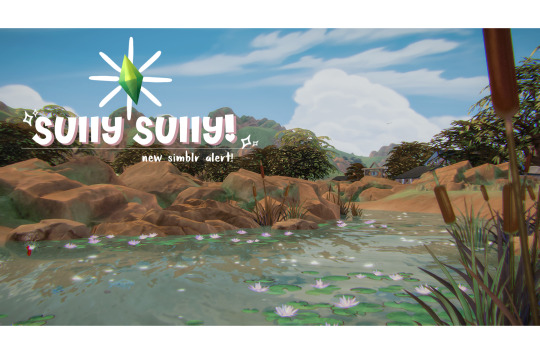
Sully Sully, Simmers~
Erratic - Lazy - Goofball
Maxis Match
Slice of Life // Action // Horror // Etc.!
CC Finds Pinterest Board
I'm Kribabe, or Kri! I saw others do cute intro posts and wanted to do one, too.
I haven't been playing the sims long - the first time I tried was the sims 2, if I recall, back on a ps1. I was kind've too young and pretty dumb to understand what the game was and preferred more stimulation from games!
But then got back into sims around 2016 with sims 4 and have been playing on and off ever since and finally decided it might be time to make a simblr to collect all my content for it!
At the moment, I merely hope to share screenshots, edits, and gameplay but I have big silly hope and big silly dreams to blossom from there into storytelling, and perhaps cc creation and so on.
I have a very come and go personality because I play a number of other games and commit a lot of focus to them here and there so feel free to come and go as you please as well!
53 notes
·
View notes
Text
Dimentio Analysis
My thoughts on this Dimentio post, recently shared with me by @iukasylvie! The post: https://altermentality.wordpress.com/2016/02/10/flair-for-the-dramatic/.
! CONTAINS SPOILERS FOR SUPER PAPER MARIO !
Okay before I address the article, I should establish my own Dimentio headcanons. I see our silly jester as a sociopath, in that he can't feel love in the same way as other people. Like Bleck, he has a void inside of him, but Dimentio fills it by feeding off of others. Basically, he likes playing around and taunting people because of how emotionally reactive they are, it's how he fills himself up. Mimi's his favorite to mess around with because she's VERY reactive. As for why he wants his own world: he wants to put on a show. The whole of existence, dedicated to entertaining him. The only characters I can liken this to are the Celestial Toymaker (DW) and the Collector (TOH).
Now first off, the article references SPM in the context of "commedia dell'arte", which was a form of theater in Italy during the Renaissance. This form of theater had three types of characters: innamorati (the star-crossed lovers), vecchi (the powerful elders of society), and zanni (the clowns). The common plot of these plays? Two young lovers, hindered by the elders, who end up turning to the zanni to reach a happy ending.

Of course, Dimentio is a zanni character type. He may not help the Count reach his happy ending directly, but his actions do lead to the wedding with Tippi so, in a sense, this does fit the archetype. And of course, I don't have to tell you who the innamorati characters are. Anyone who knows a lick about Shakespeare probably already knows the love story of Blumiere and Timpani uses a pretty strong "forbidden love" trope, but it's interesting to see this somewhat supported by other forms of theater arts! To say Nintendo and Intelligent Systems had commedia dell'arte in mind when writing SPM's story would be a stretch, but it's always cool to see some elements match across different eras and types of storytelling.
Moving on, does Dimentio care about the other minions? The article eventually concludes that yes, he must, because how could you live in a castle with four other people and not grow to love them? My headcanon lines up with this pretty well--after all, Dimentio words the Count's lie about creating a new world as a "betrayal", and a betrayal facilitates caring enough to trust someone in the first place (points at Olly's entire arc with Olivia in The New Void). But Dimentio doesn't know *how* to love, and his version of "care" is different. He likes having the others around, but as players in his game, as entertainment. That's how he sees it. He fixates on them specifically for a reason he'd never care to explain.
New Void Spoilers Below.
You could say he fixates on Luigi, too, which might seem strange when they had far less time together. Shipping aside, I think canonically Dimentio fixes on Luigi because he's the key to everything, he's a highly valuable asset and Dimentio knows it. In the New Void, this isn't exactly the case. Dimentio doesn't have anything to gain by making Luigi suffer, it's just pure fun. Sure, he COULD torment some Shaydes or D-Men instead, but they're dead and they're boring. Dimentio's also been in the Underwhere for...awhile, and Luigi is a familiar face. In his own way, Dimentio's been a little lonely. It's just that, his way of acting on this feeling is to turn it into a game of psychological warfare...
New Void Spoilers End.
Overall, the strongest part of the article is the description of Dimentio's ideal world. Don't get me wrong, I'm a big fan of darkmarxsoul's Chaos Trilogy, but this depiction of Dimentio's universe might be the best I've ever seen. “Dimentio’s goal is to maximize the amount of drama in the universe…a world with the dials of mortal anguish and despair and even joy set to maximum volume, and the banishment of the mundane. A world where he pulls all the strings to ensure this happens. The Ultimate Show.” Chilling! It's like Bill Cipher's whole Weirdmageddon deal, except rather than maximizing weirdness, DImentio would be maximizing drama, flair, and theatrics. All the world's a stage, and whatnot.
I LOVE this idea for a world of his so much that it's a wonder I haven't started writing fics centered around it already! All these new people living what they think are just ordinary lives, not knowing that it's all being orchestrated by a being that craves mere entertainment. Life as a musical, maybe a comedy tomorrow, or maybe a tragedy next week--all because Dimentio wants it to be. I mean, that's absolutely horrifying when you think about it! Enough for a brief existential crisis maybe! But it's also very cool >:)
In summary: what do we think about Dimentio? I think he's a sociopath who doesn't understand love but desperately wants to be entertained. The article's description of Dimentio's ideal world is scarily accurate and also has a LOT of fanfic potential. Dimentio himself is fun and silly, but also dangerous and probably not someone you'd want to interact with in real life.
As this is my opinion/interpretation, I'm too biased to say whether or not this aligns well with canon. But what do you think? Do you think this all fits Dimentio perfectly, or do you have other thoughts?
#paper mario#super paper mario#dimentio super paper mario#dimentio spm#headcanon#fanfic ideas#character analysis
30 notes
·
View notes
Text
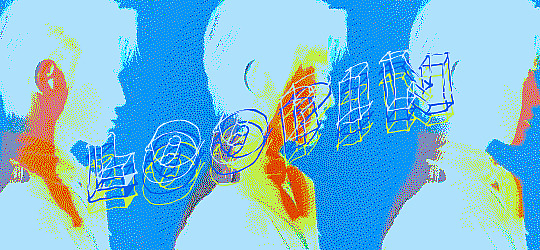
LOOPIN, THE GROUP.
First announced as 'Boy Of The Week Project' in late 2016, promised to eventually become an extension of Blockberry Creative's LOONA mostly housed under New Wave Music, BBC's novice partner company, LOOPiN was for a long time a myth: with no official records of the reported 24 trainees set to compete under 'Boy Of The Week', a mix of korean and international young men and teenagers, it's impossible to know how and when exactly LOOPiN came to be. Off the pre-pre-debut official recruiting, only seven met debut – them being Beomseok, Taesong, Minwoo, Seungsoo, Haruki, Dylan (with a one year delay compared to all others) and Haegon. Remaining members O.z, Hanjae and J.J joined the final lineup under undisclosed circumstances.
Once officially formed, LOOPiN had an almost siamese start as their sister group: debuting two to three members, one in every week of the month starting from mid 2018, then conjoining them under a unit until all 10 members had been formerly introduced to the public, officially becoming LOOPiN on August 2019.
As LOONA had The Loonaverse, LOOPiN's cosmic horror, highly nonlinear concept, named as The Looploore, stayed heavily with them up until New Wave Music's split with Blockberry Creative and complete buyout of their exclusive contracts in October 2022. Beomseok was the only original member that refused to renew and left the group, as well as celebrity life, on March 2023, quickly being replaced by Gyujin.
Known for being a highly self produced act with all members deeply involved in the creation of the group's visual, musical and storytelling aspects, as well as for having the most unlucky and polemic starts to almost every year, LOOPiN keeps on kicking high and ranking as one of the most prolific and eye catching groups in K-Pop now – a merit that seems to be far from being taken away from them anytime soon.
LOOPiN, THE MEMBERS.
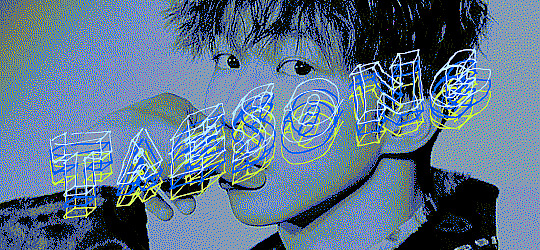
PARK TAESONG.
With a history of being mocked for his kindness and taunted for his need to please, Park Taesong has been from day one the weakling in the eyes of every single one of his teammates, and he's been fighting a never ending war to not let them mold him into something he's not – into one of them. Even when his high tendency to anxiously spiral and his chronic fear of his own frail health get temporarily in the way, Taesong is always choosing to try to stay calm, stay sane, stay by his own side – but he still might prefer to give up on himself before he gives up on LOOPiN.
He's gentle, cowardly, optimistic, controling.
GIVEN NAME: Park Taesong. OTHER ALIASES: Taeng (nickname). BIRTHDATE: 02.15.97. PROFESSION: Idol. GROUP POSITIONS: main vocalist, leader (2019 - early 2022). ETHNICITY: Korean. NATIONALITY: South Korean. FACE CLAIM: Seo Dongsung.
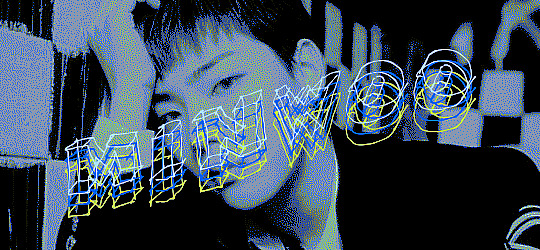
BANG MINWOO.
Bang Minwoo believes he's known hunger more intimately than anyone else around him, and for that, he is brutal. With a relationship with music that borders on obsession, he's given up body and soul for his art and will spare nothing to keep LOOPiN going – or so he wants the world to believe. Truth is, there is a caring, deeply empathic nature in Minwoo that he's been trying to ignore for years, and it's dormant now, but not gone. Ever since he began being confronted by past actions and his own secret history, Minwoo hasn't been able to sit with himself at peace and sleep.
He's dedicated, irritable, reliable, obsessive.
GIVEN NAME: Bang Minwoo. OTHER ALIASES: Noah Bang (english name). BIRTHDATE: 07.08.97. PROFESSION: Idol-songwriter, music producer. GROUP POSITIONS: leader (early 2022-), main rapper, vocalist, dancer, group producer. ETHNICITY: Korean. NATIONALITY: South Korean (Guryong natural). FACE CLAIM: Lee Changyoon.
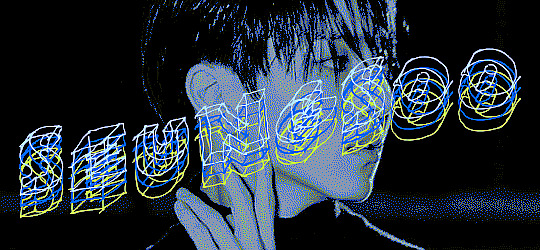
NA SEUNGSOO.
Na Seungsoo has always marched to the beat of his own drum, in a rhythm that hardly makes sense to anyone else. The never serious, untalented with academics youngest child of a lineage of successful doctors, Seungsoo took a gamble with the entertainment industry and believes himself to have won big. But where his stage act is a success, his interpersonal relationships suffer – quick to love and even quicker to hate, practically a stranger to forgiveness of even the smallest off offences, Seungsoo can't help but hurt everyone he tries to guide to what he considers to be safety.
He's romantic, intrusive, enthusiastic, impulsive.
GIVEN NAME: Na Seungsoo. OTHER ALIASES: Sonny Na (english name). BIRTHDATE: 10.19.97. PROFESSION: Idol, music producer, choreographer. GROUP POSITIONS: lead vocalist, lead dancer, group producer. ETHNICITY: Korean. NATIONALITY: South Korean (Busan natural). FACE CLAIM: Kang Hyunggu.

FUKUNAGA HARUKI.
Coming from one of Japan's longest artistic driven families, a direct descendant of a long line of dancers, painters and classic musicians, Fukunaga Haruki was always expected to conquer the world. Now standing as a KArts drop out with an addition to highs and lows first, successful Idol second, Haruki can't see himself as anything but a projectile that failed on the launch path. He might be LOOPiN's most well known face, but that hasn't come without a price – as the keeper of secrets that can bring his entire company to ruin, he has to be compensated. But after years of pretending, his luck seems to have run out and the silent act has grown tired.
He's passionate, evasive, resourceful, mercurial.
GIVEN NAME: Fukunaga Haruki. BIRTHDATE: 09.22.98. PROFESSION: Idol, dancer, model. GROUP POSITIONS: main dancer, vocalist, visual, face of the group. ETHNICITY: Japanese. NATIONALITY: Japanese. FACE CLAIM: Takahashi Fumiya.
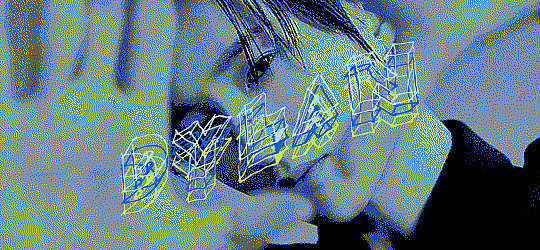
DYLAN HWANG / HWANG CHIHOON.
An only child born from a dreamy teenage affair in South Korea, Dylan Hwang was raised by his single mother and his grandparents in Santa Monica, California, unknowing of the identity of his father, unknowing of what to do with himself. Picking up his mom's long lost dream of living trought music, Chihoon started auditioning to entertainment companies in hopes to find some sort of enlightenment in fame, got a break of spirit instead – it seems that as long as he's got an eye open, he'll keep on being a quiet witness and attender of the worst the world has to offer.
He's selfless, repressed, attentive, paranoid.
GIVEN NAME: Hwang Chihoon. OTHER ALIASES: Dylan Hwang (english name). BIRTHDATE: 03.17.99. PROFESSION: Idol, singer-songwriter. GROUP POSITIONS: lead vocalist, songwriter, concept co-director (2023-). ETHNICITY: Korean. NATIONALITY: Korean-American. FACE CLAIM: Lee Changmin.
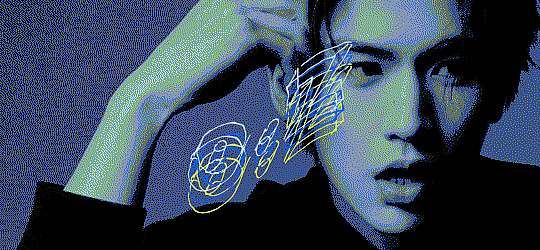
WU ZHIMING / OH JIMIN.
Born chinese, raised with an iron fist in Seoul, O.z has felt essentially split from a young age. Absorbing a stoicism from his executive father he still can't let go off, Zhiming can only be unapologetically himself trough his genre defying, highly unpopular music. He became an Idol out of spite, set to hate it, but found a new side of himself trought his stage persona and the A list world he's set in – one that the black and white sense of morality he's cultivated trought life makes O.z an odd man out on. It seems Zhiming doesn't ever get the comfort of being able to pick the good side of fame.
He's truthful, blunt, confident, contrarian.
GIVEN NAME: Wu Zhiming. OTHER ALIASES: O.z (stage name); Oh Jimin (korean name). BIRTHDATE: 03.08.99. PROFESSIONS: Idol, DJ, music producer. GROUP POSITIONS: main rapper, group producer. ETHNICITY: Chinese. NATIONALITY: South Korean. FACE CLAIM: Zhang Linghe.
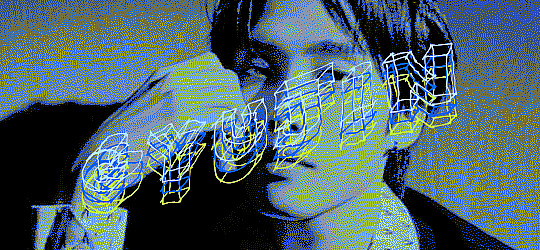
WOO GYUJIN.
A once commercial kid on the rise, Woo Gyujin vanished from the spotlight in his tween years and came back with a brand new face, brand new body and a fully developed voice, an adult with a solid base built over the buried skeletons that were once in his closet. His inherited need for a long, quiet life of stability keeps crashing with his want to be famous and seen. Now integrated into a group filled with chaos addicts and missing pieces, mess might crawl its way into his new life and doom Gyujin once again if he doesn't do something to help close the open wounds of his bandmates.
He's adaptable, incitive, assertive, unstable.
GIVEN NAME: Woo Gyujin. BIRTHDATE: 01.11.99. PROFESSION: Idol, actor (formerly). GROUP POSITIONS: main vocalist, songwriter. ETHNICITY: Korean. NATIONALITY: South Korean. FACE CLAIM: Bae Jooyoung.
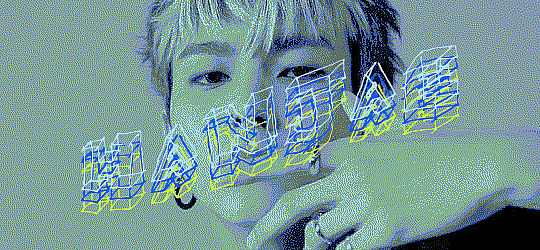
LEE HANJAE.
An extremely quiet child and an even more dismissible teenager, Lee Hanjae wouldn't dare to dream of the spotlight until it came offered to him in a once in a life opportunity. With an ease to art in it's many shapes budded for years while being the target of ill driven mismanagement, Hanjae is the new face being pushed, and to his own bewilderment, the public embraces him as an actor in a way that's foreign. Thriving on a new career path while his members seen close to reaching rock bottom, Hanjae can't make a single move – he's too afraid of what he might do if he ever let's himself reach for what he wants.
He's thoughtful, insecure, reserved, selfish.
GIVEN NAME: Lee Hanjae. BIRTHDATE: 04.02.00. PROFESSION: Idol, choreographer, actor. GROUP POSITIONS: main dancer, lead rapper. ETHNICITY: Korean. NATIONALITY: South Korean (Incheon natural). FACE CLAIM: Oh Seongmin.

XU JIAHANG.
The youngest son of a blockbuster movie director and Miss Chinese International 1989, J.J had fame promised to him as a birthright. Spoiled rotten in his early years, the world took no time beating him off his pedestal while making him look cruelty deep in the eyes once he became a teenager, making Jiahang develop a need to hide every inch of himself, turn into a doll to keep – no more. Fully aware of his worth once again, he wants in back into spotlight and the fun of adoration, and there's something not quite right about his ambition – it's a factor of deep change. But each step up the ladder only enhances the promise of a nasty fall.
He's loyal, cunning, understanding, overachiever.
GIVEN NAME: Xu Jiahang. OTHER ALIASES: J.J (stage name); Jason Xu (english name); Jay (nickname). BIRTHDATE: 12.10.00. PROFESSION: Idol, model. GROUP POSITIONS: sub rapper, sub vocalist, visual. ETHNICITY: Chinese. NATIONALITY: Chinese (Beijing natural, Hong Kong and Manila adapt). FACE CLAIM: Xue Bayi.

KIM HAEGON.
Kim Haegon is a time bomb shaped kid trapped inside the body of not quite enough famous, just turned legal adult. Terrified of abandonment even if it's a feeling too well known, Haegon attracts and keeps cruel company, all to avoid being alone with himself. Recently and forcedly divorced off all the relationships that kept him grounded to his childlike ways, Haegon wants maturity, and he wants it now – to be good in someone's eye, he's ready to beg and kill. The road to emotional recovery is a long one, and Haegon doesn't yet know how far his feet alone can take him.
He's intuitive, dependent, devoted, desperate.
GIVEN NAME: Kim Haegon. BIRTHDATE: 03.22.01. PROFESSION: Idol. POSITIONS: lead vocalist, lead dancer. ETHNICITY: Korean. NATIONALITY: South Korean (Seoul natural.) FACE CLAIM: Park Jihoon.
#&& ⠀ [ . . . ] hound on a hunt ⠀⸻ profiles .#fake kpop group#fictional idol community#kpop au#kpop fanfic#kpop oc#typos will be corrected tomorrow! ignore them for now!
43 notes
·
View notes
Note
Now that you've completed the SMT V stream, I (and I'm sure some other folks, too) would love to hear what you think of it compared with the other main Megaten games you've played on stream. I think you've done SMT 1, SMT IV and SMT IV:A so far. Include Persona 1 too if you'd like.
And that dreadful Tokyo Mirage Sessions: pound sign Fire Emblem, too
SMTV is hard for me to discuss because there's very little about it that compels me to deeper thought. It really, genuinely bores me to think about, and anything I do have to say about it only evinces an incredibly cynical read of the series. I'll just put whatever I have left to say here, so that I don't feel the need to revisit.
It's just, you know, this bloodless cultivation of recycled semiotics from Nocturne. We ragged on IV for being overly invested in derivation and homage, but it looks almost daring coming off of V. The only really original idea that it brings to the table, the notion of Nahobino as the 'true' form of these divided and depreciated myth images, is almost offensive in the way it reframes designs that at least try to approximate real cultural attitudes towards religion as lesser, enervated reflections of yet more Tokusatsu tripe. Apart from that, it's a very inert piece of storytelling. I feel like a joke is being played on me whenever the game presumes an emotional investment in characters like Tao or Yuzuru.
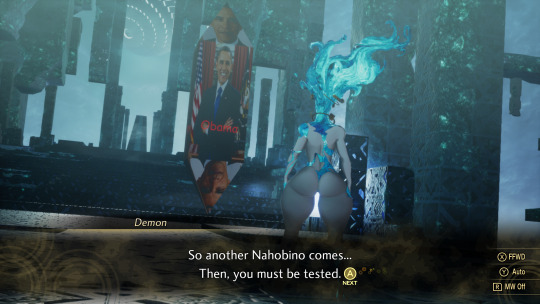
I generally think highly of all the little design wrinkles that were implemented under Komori's stewardship, and that owe to his experience directing the more balance-intensive affairs of Etrian Odyssey. The new utility of consumables, dampeners as a limited means of addressing weakness in party structure, the need to attend to enemy and player Magatsuhi gauges etc. All necessary supplements to a battle system that was beginning to wear thin by 2016. Only my opinion of everything that enfolds it, the exploration, was diminished on this second playthrough. The layouts are still compelling, with a novel emphasis on managing layers of verticality, but they're populated with so much idiot open-world cruft. Vending machines, chests, glory crystals, health orbs, Miman. An overabundance of piddling incentive to keep you in a state of compulsion, and which I believe contributes to the exhaustion that many players feel come Taito. I still like the Miman, but they essentially exist in a continuum with the fucking feather collectables in Assassin's Creed.
(All the colored orbs littered around the sands are the perfect wedge to that design sensibility. They're almost totally inconsequential and only worth pursuing for the feeling of having absorbed more bright bobbles into yourself. They whisper to your lizard brain so that you don't feel too unstimulated navigating the space, which is never deigned to be worth the doing for its own sake. I'm out here picking up orbs and I can't even use them to extend the duration of Spartan Rage. Videogames are fucking stupid.)
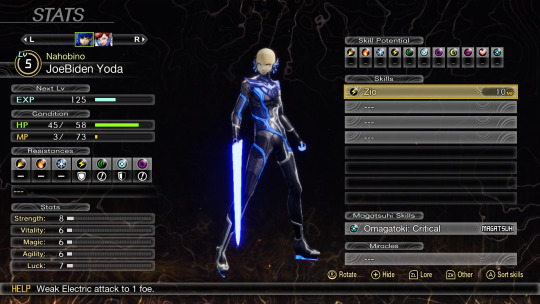
It also made me more conscious of the ways the game fails to leverage art direction against what were probably non-ideal production conditions. It's never easy to forget that you're in a world of economically distributed UE4 assets, with no less than four brilliant hues of sparkling sand and ruined structures that have largely forfeited the Tokyoite specificity of previous games in favor of the same vending machines and multi-floor apartments and office buildings repeated ad nauseam. Daat never feels more like a hostile environment than a self-conscious playground. The concept art backdrops and rudimentary 3D textures of IV/IVA, and the claustrophobic interiors of I- all more lively by far. Pretty good skyboxes, though. No complaints there.
I think the series has moved into the sort of tired self-pastiche that every franchise turns to after decades of iteration. Time and chance happened, and now it's Angus Young crawling out of his mansion and into his boy-clothes to duckwalk across the stage while his grapefruit-sized prostate wages war against him from within.
If I were to rank just the main series from what we've streamed thus far, it would be something like I > IV > V > IVA. The only sense in which TMS has it at a disadvantage is that it emulates more cleanly. I'm glad that we're done with the latter half of the series and can finally move on, but I'll never forget that big huge enormous ass...
33 notes
·
View notes
Note
What was your inspiration to write a mafia/mob/cartel/la familia type story?
So, I was primarily raised by my grandma and her sisters and they loved mafia films. Like, my grandma considered Robert De Niro to be her man. My grandma apparently wrote a whole mafia story in her notebook when she was a teen. 😂
I saw Once Upon a Time in America (my grandma's personal fave) and parts of The Godfather when I was really young, but I wasn't enthralled in these films. I didn't even understand the workings of the mob. Yet, I respected these and held fascination for them because it was my grandma's interest and I love my grandma!
Some time passes. I'm in 6th Grade. My best friend becomes obsessedddd with Scarface. [which I feel is a general thing that's apart of black culture 😂😂] I mean she has her first fictional crush! And I'm in class endorsing it like a good friend! I saw that movie a total of three times when I was a preteen due to the love of my friend, including a lousy BET cut and even now I would say that is one of my favorite gangster films.
Some more time passes and I'm still really into this genre even though I'm still dumb about the inner workings and hierarchy. I just know it's suits and action! In high school I wrote a shitty mafia AU story for a anime fandom I was in. We don't talk about that, but it was like a stepping stone and it was fairly well-received by my friends.
Fast forward into adulthood and in 2016-ish? I made my OC Sal! Although Sink or Swim takes place in the modern day, Sal and Eve were originally historical ocs! So, I tried to do a lot of research through film. Instead of watching documentaries or reading thoroughly, I watched films like Harlem Nights, Goodfellas, Mean Streets, Godfather, A Bronx Tale, Casino! And in watching these movies I had the mindset of, "okay, I wanna take these elements for Sal, I wanna leave plot themes like this out."
also shoutout to the video games Mafia I, II, and III. They had some immersive storytelling.
I roleplayed Sal for awhile on tumblr and eventually I met @ladygangsters who was equally into the gangster genre! But due to her love of the series Narcos, I learned a lot more about the cartel beyond my shallow Scarface knowledge. She's really the one with all the cartel ocs, broadening my horizons!😂
I didn't know if I wanted to do a gangster story on simblr tbh. Mostly because tackling a complex story was daunting and it's WAY EASIER to just do slice of life narratives. When I first started Sink or Swim I was lowkey freaking out irl like, "I don't know what to do, I don't know I'm doing, oh my god I'm gonna torment myself with this story."
But I didn't scare ya'll away with my content. I didn't feel overwhelmed when I reached certain heavy points of the story. I feel like I trust myself to tell this story now more than I did when I first plotted it out. And now I'm doing a lot of heavy co-writing with @ladygangsters and we treat our writing the way we would if we were still rping with each other, so that brings a high level of comfort.
12 notes
·
View notes
Text
K-Dramas recommendations & short reviews
Because I've watched way too many to not make a list. Warning: I like romance and fantasy a bit too much.
These shows made me cry. 10/10. Five stars. Recommend to anyone. They live in my mind rent-free:
Extraordinary Attorney Woo (2022) - Attorney Woo is such a wonderful person, I love her character. I can't say much about the representation, but I like that it opens up the conversation around autism & neurodivergence, discrimination and prejudice, particularly in work environments. I rarely like shows about law or lawyers but I was surprisingly engaged with the cases and the story. It deserves a second season. (The only thing I don't like about this show is they're pushing for a MinWoo and Choi Su-Yeon ship. Which huh--disrespectful.)
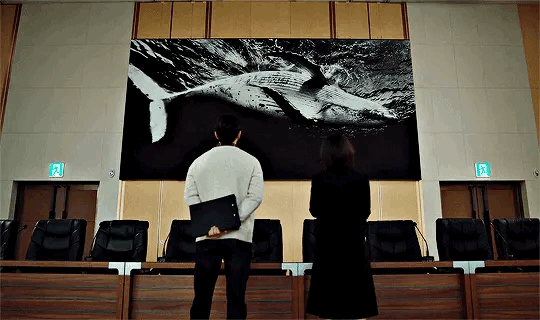
Hotel Del Luna (2019) - A great place to start with k-dramas if you like paranormal fantasy. This show has such a special place in my heart. I wanted a different ending but I am okay with it because it was a tight narrative. The main character is iconic (Man-Wol please step on me). The show has amazing sets, AMAZING costumes, an amazing OST, amazing and heartbreaking performance by Yeo Jin Goo. The main couple is so soft; like they're such good friends and coworkers and gentle with each other (eventually). It's enemies to reluctant friends to lovers. It's perfect for asexual viewers who want more than physicality in their romance shows. Cons: the secondary characters' goodbyes and backstories left a little to be desired. A few other nitpicks like Chang-Seong is the one to suggest the main character a new hobby instead of her just discovering it by herself.
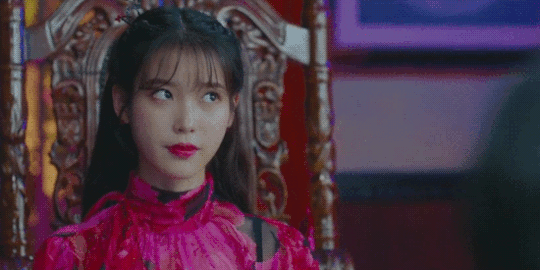
It's Okay to Not Be Okay (2020) - Also a good place to start with k-dramas. This show is a lesson in good narrative; this has perfect writing & storytelling. The cast is so good. The female lead is an icon. The character work I excellent. The mental health issues are so well addressed and it taught me a lot about mental health I wasn't aware of. Each small minor character plays a very important thematic role. (The villain isn't the best thing ever but she serves her role in the themes and plot.) The production and the storytelling with the children's book animations are just *heart eyes*. The OST is so good too. You need to watch this to understand how good a k-dramas can be. A must-watch.
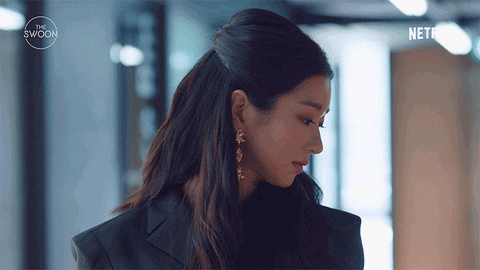
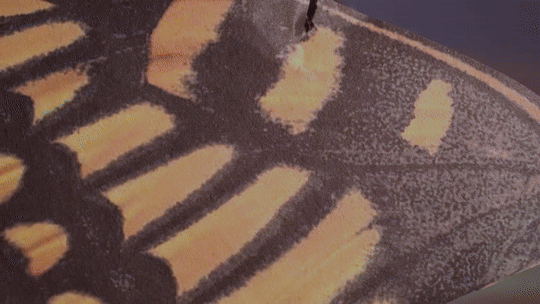
Goblin: The Lonely and Great God (2016) - This is the most iconic fantasy/paranormal k-drama ever. A lot of current tropes were started here I think (including the weird k drama last-episode time jump separation of the main couple). This show broke me. You will cry. The bromance and comedy are amazing here too. Gong Yoo and Dong Wook Lee have great chemistry. Main female lead is so cute and her character is so heartwarming. The ending felt a bit rushed. The death, existential related stuff with the grim reapers and such is so good tho.

Business Proposal (2022) - Best rom-com ever! (Well, it could be gayer tbh.) It's my new comfort show. I already watched it twice. It's campy, hilarious, chaotic, iconic and messy in a way that feels like real life (but obviously played up for drama and comedy). Excellent character work. The love interest is definitely written by a woman. Gorgeous cast (Sejeon omg I have a crush, but also the others). It was too short! I would have loved another episode, and more of Grandpa and Ha-Ri. Warning: this has the weird kdrama last-episode time jump couple separation.
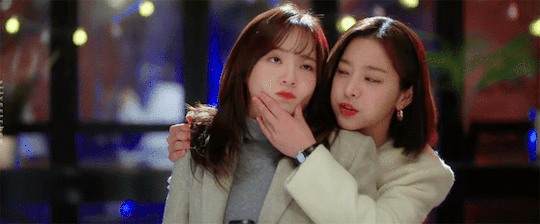
W: Two Worlds (2016) - A young resident medic accidentally finds her way inside the webcomic her father created. Like, that premise is killer. We have Lee Jong Suk at his finest here; the character fits him so well. He was born to play a lead. This show has amazing meta-commentary on writing, authorship, and existential crisis. The confrontation between the webcomic character Kang Cheol and the author is insane! The main couple is an epic pair. Would rewatch. High wump value. Cons: The second part could have been more swoony with the romance, Kang Cheol kind of became a bit cold. (A warning: this show also has the k drama weird last-episode time jump couple separation.)

Would recommend with popcorn, I rate them 8/10:
Crash Landing on You (2019) - Really good. The main couple has the best chemistry I've ever seen. It's not that much of a personal fave show, but still pretty awesome and will tug at your heart. It got a bit overly dramatic in the last episodes and again, has that k-drama last episode weird time jump couple separation, but here it actually makes sense. And sort of mirrors the separation and eventual unification of the Korean Peninsula. It was very interesting to see the contrast between North and South Korea.
Shooting Stars (2022) - Aside from the terrible, horrible, insulting Africa storyline (where the male lead goes to 'help' African kids with water scarcity, not even a country name is called, he just goes to *gestures vaguely* Africa to help goddammit he's such a beautiful soul! /s) There's a weird creepy sugar mommy wannabe side storyline and it's weird and out of nowhere. But the rest of it is good and campy and the main characters are so cute. All the couples are cute. The male lead is a cute disaster. Female lead is also a capable cutey but a disaster when it comes to romance. It's hilarious. I love all characters. It's fun. It's great. It shows a very interesting side of the entertainment industry.
While You Were Sleeping (2017) - A man and a woman who don't know each other have precognition powers and after they meet, they use them to take down a corrupt lawyer. The show isn't very heavy on the romance, tough the pair work pretty well together. I liked the main actress. Lee Jong Suk has chemistry with anyone. The male role was not exactly a good fit for Jong Suk. He's so much more naturally charming than the character. It's a fun show to pass the time. The found family is nice and all the characters work great together. The mom is great.
The King's Affection (2021) - I'm going to be honest, I didn't finish watching this. Ups. I got bored after episode 15. It's a very slow show but what I watched was quite good. It was just not a show for me. Having a bisexual male lead was awesome, I appreciate that he falls for the main character while he thinks she's a man. (Could be gayer tho, just saying.) Pretty good discussions and reversals of gender cliches. It has complicated parent-child relationships that are very well written which gives a lot of heart and heartbreak to this story. The political stuff gets very convoluted. I really wish the queer part was bigger though, and not limited to the main couple. We could even have poly representation! I still have half a mind to finish this but I don't know There are so many other shows I'd rather watch instead. (Boy, I really need to get into the actually queer side of k-dramas because the side I'm currently on is giving me crumbs.)
Lovers of the Red Sky (2021) - The premise was so cool. This has so much lore I like and the setting is beautiful and rich, but it also has so much lost potential. The plot is very weak in the second half and could be restructured. I loved the atmosphere, costumes and the actors and their characters: the blind cursed scholar nobleman, the female genius cheeky painter and her friend trio and the prince are all great characters. Ahn Hyo Seop is pretty good in it and looks very pretty indeed in historical costume (but the design of the villain creature he's possessed/cursed with is so, so bad omg). Great premise failed execution. Good first half but it went over the rails quickly. Still entertaining if you like historical fantasy.
Romance is a Bonus Book (2019) - It's a bit slow and could have done so much more with the female lead and her child. She's a bit underwhelming and her daughter is barely in the story. The second female character played by Jeong Eu-Gene was awesome, I love this actress now. Lee Jung Suk is always looking hot and being an excellent actor with what he's given; he's very charming here. He could have chemistry with a piece of wood and yet I wasn't that fan of the romance. Maybe it's just because friends to lovers isn't my cup of tea. There's a weird out-of-nowhere backstory between the male leads. The commentary of ageism in the workplace is a bit surface level (it's not that big of a deal for the company if you're overqualified for a job, the point should be that is an issue for you and your career, who is too good for the company). You can tell the writers really care about books; it's definitely a love letter to editors and an interesting window into the world of book publishing; you can feel the love editors put into making books. Bonus: the founding members of the publishing company have very funny moments.
Do no recommend:
King: Eternal Monarch - Couldn't even finish this. I was so, so confused. The dialogue, narrative and backstory make no sense! Everything is so unnecessarily confusing. There's no chemistry between the main couple. The king and the bodyguard had more chemistry. Lee Jung-Jin (playing the villain Lee Lim) & Woo Do-Hwan (the bodyguard) carried this show and are pretty much the only thing good about it. The female lead is sidelined. It had an intriguing premise but failed execution.
What's Wrong With Secretary Kim - Skimmed most of the second half. It's a mess. The love interest CEO is such a narcissist and asshole he wouldn't be able to keep a working, healthy relationship with his partner without some serious therapy first. The female lead seems to be repulsed by him most of the time even when together and even looks scared when they get intimate. There's an unnecessarily convoluted plotline about the main lead's brother and a kidnapping in their past. It has tonal issues and it's cringy rather than funny. The secondary characters are just a lot of useless filler. The female lead sacrifices her independence and dreams to be with the main guy. Just go watch Business Proposal instead.
Moon Lovers: Scarlet Heart Ryeo - The only pro of this show is IU. The romance went the undeveloped route. Cheap-looking production, with too many episodes, melodramatic, characters pivot in place instead of naturally developing; it's definitely a telenovela. The point that the female lead is from the future doesn't even matter for the story (should have made her a Goryeo historian instead of a random cosmetologist). Pass!
Tomorrow - Could not finish watching. Please, please don't watch it if you're dealing with depression, bullying or suicidal thoughts. Please don't. By episode 2 I was just screaming at the screen. Problematic? This show invented the word problematic. The supernatural task force that's supposed to save people with suicide risk is terrible at therapy and suicide prevention. They tell the person trying to commit suicide, literally on the edge of a building about to jump, that they should do it, that they're weak, they should just jump, go ahead! Like ... what????
Mystic Pop Up Bar - Didn't capture me by episode 2. Got bored. Some say this is better than Hotel Del Luna but I don't agree.
Abyss - It's a weird tonal mix. Would have preferred if it leaned further into the absurd (go all in with the humour or don't at all), the sci-fi or the murder mystery. Instead of just revealing by episode 3 who the murderer is, quickly changing the plot into a chase after the villain, even though he's so lame. But also he is keeps killing people and it gets dark. And then we cut to the main couple being silly and cute. It's so jarring. The leads have a great dynamic and Ahn Hyo Seop knows how to differentiate his characters really well, give them their own flavour., but in the end it's just a cool premise, failed execution. Very average.
Currently watching:
The Crowned Clown - Very interesting concept and gorgeous, gorgeous visuals. Plot drags a little. Has some tonal problems and oversimplification of politics. The best part is when Yeo Jin-Goo acts with himself haha. He's such a talented actor.
The Uncanny Counter - Get's a bit melodramatic sometimes but all four main actors are insanely good.
Tale of the Nine-Tailed - The main romantic relationship needs a lot more development, but the entire show is worth watching just for Dong Wook Lee and Kim Bum as brothers.
Alchemy of Souls - 6/10 so far. Currently watching season 2/part 2. Aside from the prince, I don't particularly care for any of the characters. Unpopular opinion but the main romantic pair have no chemistry. Mu-Deok has more chemistry with Yul and the prince, and the prince has more chemistry with Jang-Uk. The lore is confusing and inconsistent: it breaks its own rules. (Two souls in one body what?? when was this established as a thing?) There's not enough foreshadowing and setting up the rules of magic in this world (the Ice Stone comes up as a deux ex mahcina big plot point in the last second). It also drags; the episodes are too long. There's a lot of saying and ultimately the show doesn't deliver. The narrative structure is straight out of a fantasy Wattpad. The set and costumes are fun and cool for a fantasy world, and the first episode was great.
#k dramas#kdramas#recommendations#tv show recs#hotel del luna#it's okay to not be okay#goblin the lonely and great god#extraordinary attorney woo#business proposal#w two worlds#romance is a bonus book#lovers of the red sky#the king's affection#while you were sleeping#shooting stars#sh**ting stars#crash landing on you#alchemy of souls part 2#the uncanny counter#tale of the nine tailed#the crowned clown#tomorrow kdrama#media recs#media recommendations#k drama reviews
79 notes
·
View notes
Text
Writer Spotlight: Claire Ahn
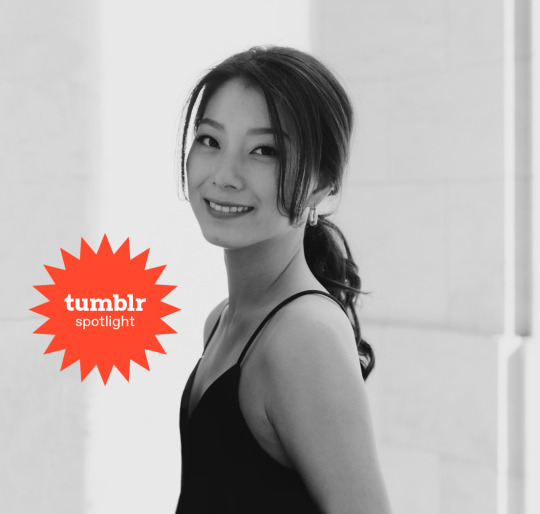
Claire Ahn grew up in Seoul, Korea, which she still considers home. She moved to New York to attend university and now lives in Long Island City with her husband, newborn daughter, and their dog, Dante. Claire writes about transcultural experiences and the traditions, values, and legacies that shape who we are. I GUESS I LIVE HERE NOW is her debut novel. Click through to read about mouth-watering food and homesickness remedies, and for some really good writing advice.
Can you tell us a little bit about how you came to write I GUESS I LIVE HERE NOW?
I think most debut authors would probably divulge this, but the first novel is always a bit of a circuitous path. You can never really pinpoint the beginning of the first because it’s just this blurry idea you had years ago that somehow—through repetitive classes and workshopping and rejections—becomes a novel. I suppose this idea was conceived back in 2016, but it’s gone through many transitions, from a children’s book to a middle-grade book, then a young adult novel, and within it, about four to five full revisions.
I started writing to release stress from a grueling job in public relations, where writing felt so formulaic and not at all creative. I’ve always loved storytelling, and was told PR is the world of storytelling as a profession, but it wasn’t enough to fill the creative well in me. So I took up course writing at Gotham Writers Workshop, which is how this all began for me. Plus, I got free wine every week. How could I have stopped attending?
You’ve written your own experience in reverse, going from New York to Seoul, and made it YA. What were some challenges you faced in doing so?
From a craft perspective, it was hard to write Seoul as if it was the first time. Everything there feels second nature to me, from the street foods to the lavish grocery stores and intensely beautiful cafe culture. It’s never a shock when I go back home, so having to write it fresh was hard. Hopefully, I somewhat successfully captured the newness of it from Melody’s eyes. From a personal experience perspective, my constant fear is that someone in my life will be convinced a flawed character was inspired by them! Woof. If you’re reading this, close friend or family member, this is not the case!
Melody and her friends are all navigating parental expectations while trying to make their way in the world. What do you hope readers take away from seeing these character dynamics represented?
Am I the only one feeling like I sometimes live my life intensely trying to please my parents? Oh God, I hope not. I hope readers feel seen and less alone in having dreams that may defy the wishes of parents or guardians or even of peers and the capitalistic society in which we live. I hope readers feel reminded that they can simply be. They can have lofty dreams like Melody, or they can want to dream of being comfortable and accepted in their skin, like Kimbeom, or they can just want to live in their present, and that is all okay and good. Let’s change the narrative of having to stamp influential footprints in this world.
Seoul is your home, but you live in Long Island City. How do you approach writing about being in between two cultures, and what’s your favored remedy for homesickness?
I think I operate on a default state of longing and clinging. I’m always longing to visit Seoul any chance I get, and I live in a state of clinging onto my culture tighter than my high school banquet dress. I release myself from those states of being by writing stories where I get to pretend like I’m in Seoul again or where I imagine my life as a teen in New York, fresh from Korea. My favored remedy for homesickness is buying a plane ticket to Seoul and immediately texting my friends back home that I’ll be there soon. Then, every day until I’m on that plane, I dream of being surrounded by faces like mine, speaking in my native tongue, and stuffing my face with high-quality rice cakes (dduk). Does that sound sad? I swear I love my life in New York, too.
The descriptions of food in IGILHN are incredible. What’s your favorite Korean dish, and can you make our mouths water describing it?
Thank you! You know, I didn’t know food was a theme in the book until people pointed it out. Food is such a deeply ingrained part of Korean culture that it wasn’t an intentional ploy, but as it turns out, it is impossible to write a book set in Seoul without a proper description of the bounty of food on offer. My favorite dish has got to be my mom’s homemade galbi jjim, braised short ribs. I can’t even eat ones from a restaurant because it tastes horrible compared to her concoction. It’s a common holiday dish for New Year’s or Chuseok, but for me, it was the dish my mom made every time I landed in Seoul from New York. An expression of love poured into a dish that takes hours to make. I always imagined her making it in the kitchen the night before I arrived, eagerly waiting for her younger daughter to come back home. It’s a thoughtful dish because it’s not something you can whip up at a moment’s notice, and if you try to, you will never mimic a galbi jjim that has been simmering for hours. It’s both a deliciously sweet and intensely aromatic and savory dish. When done right, the meat falls off the bones at the softest pull with chopsticks, and it’s generously coated with a sauce made from Korean radishes, jujubes, pears, chestnuts, and garlic. As my husband says, it’s a ‘flavor explosion.’
What made you want to be a writer? What advice can you give to budding writers working on transcultural narratives?
I’ve always wanted to be a writer, but growing up in an Asian household, I wasn’t made aware that writing was a chosen profession. I was sort of led to believe it was something you did on the side of your ‘real’ job, which just meant making a stable income with the goal of homeownership. As a daughter of immigrants, stability was highly valued in our household, so writing wasn’t really a ‘serious’ option. But I wrote my first play when I was in the second grade, a whopping eleven pages of some friends living on Mars, spying on Earth people.
My advice would be to find a writing community and celebrate small milestones. I couldn’t have gotten here without my group of writers that I met through Gotham Writers; equally, I might have given up if I wasn’t so damn good at celebrating even the stupidest things: Submitted a manuscript? Buy myself a typewriter! Read a book during a desolate book lull? Eat my favorite ice cream! The journey to finding an agent, revising, then selling your book, then revising again (and again and again and again), then finally seeing it hit shelves (which I haven’t yet) is LONG! So, unless you’re a total Grinch and happy to be one, celebrate; because you can’t go years without that celebratory joy to keep you motivated.
What does Melody’s Tumblr look like? Obviously, she’s got some interior design in there, but what else does she post? What’s the vibe like?
The vibe is definitely a modern cafe look with a splash of pop, which is also her fashion style. Isn’t our Tumblr vibe just a digital reflection of our fashion? Mine definitely was. Mel’s Tumblr is probably like Comme des Garcons meets Alexander Wang.
IGILHN is your debut novel—what’s next for you?
I’m working on my second book now, and it’s not set in Seoul! It’s set right here, in my second favorite city, New York. Everyone says book two is the worst. Surprisingly, I don’t want to rip my eyes out, and I’m thoroughly enjoying exploring my new fictional friends and their immigrant families and New York’s Asian food culture. Soup dumplings have already made their way into my pages multiple times. I can’t share too much yet, but I hope it stays as fun as it’s been so far and that it finds its people.
Thanks so much for answering our questions, Claire! I GUESS I LIVE HERE NOW will be hitting shelves on May 24. That’s today in a week!
#writer spotlight#claire ahn#I guess I live here now#aapi month#ya fiction#pre-release#seoul#korea#aapi fiction#booklr#aapi lit
555 notes
·
View notes
Text
"Fantasy and science fiction in their very conception offer alternatives to the reader’s present, actual world. Young people in general welcome this kind of story because in their vigour and eagerness for experience they welcome alternatives, possibilities, change. Having come to fear even the imagination of true change, many adults refuse all imaginative literature, priding themselves on seeing nothing beyond what they already know, or think they know.
Yet, as if it feared its own troubling powers, much science fiction and fantasy is timid and reactionary in its social invention, fantasy clinging to feudalism, science fiction to military and imperial hierarchy. Both usually reward their hero, whether a man or woman, only for doing outstandingly manly deeds. (I wrote this way for years myself. In The Left Hand of Darkness, my hero is genderless but his heroics are almost exclusively manly.) In science fiction particularly, one also often meets the idea I discussed above, that anyone of inferior status, if not a rebel constantly ready to seize freedom through daring and violent action, is either despicable or simply of no consequence.
In a world so morally simplified, if a slave is not Spartacus, he is nobody. This is merciless and unrealistic. Most slaves, most oppressed people, are part of a social order which, by the very terms of their oppression, they have no opportunity even to perceive as capable of being changed.
The exercise of imagination is dangerous to those who profit from the way things are because it has the power to show that the way things are is not permanent, not universal, not necessary.
Having that real though limited power to put established institutions into question, imaginative literature has also the responsibility of power. The storyteller is the truth-teller.
It is sad that so many stories that might offer a true vision settle for patriotic or religious platitude, technological miracle working, or wishful thinking, the writers not trying to imagine truth. The fashionably noir dystopia merely reverses the platitudes and uses acid instead of saccharine, while still evading engagement with human suffering and with genuine possibility. The imaginative fiction I admire presents alternatives to the status quo which not only question the ubiquity and necessity of extant institutions, but enlarge the field of social possibility and moral understanding. This may be done in as naively hopeful a tone as the first three Star Trek television series, or through such complex, sophisticated, and ambiguous constructions of thought and technique as the novels of Philip K. Dick or Carol Emshwiller; but the movement is recognizably the same – the impulse to make change imaginable.
We will not know our own injustice if we cannot imagine justice. We will not be free if we do not imagine freedom. We cannot demand that anyone try to attain justice and freedom who has not had a chance to imagine them as attainable.
I want to close and crown these inconclusive meditations with the words of a writer who never spoke anything but truth, and always spoke it quietly, Primo Levi, who lived a year in Auschwitz, and knew what injustice is.
The ascent of the privileged, not only in the Lager but in all human coexistence, is an anguishing but unfailing phenomenon: only in utopias is it absent. It is the duty of righteous men to make war on all undeserved privilege, but one must not forget that this is a war without end."
- Ursula K. Le Guin, from "A War Without End." Utopia, 2016.
#ursula k. le guin#primo levi#quote#quotations#storytelling#fantasy#science fiction#sci fi#imagination#freedom#utopia#dystopia#justice#activism#revolution#books#reading#oppression#injustice#patriarchy#privilege#capitalism
59 notes
·
View notes
Text
as of today i am officially 31
an annoying number, most of all because its prime.
in other times, older times, that would have been halfway through and that is a worrysome thought. im still not there thanks to modern medicine but still. humanity knew this ammount as a tipping point into decay.
but no. i live in the modrn age, i am undoubtedly young and i have a whole life ahead of me. this year finds me facing yet another challenge not too dissimilar from those i faced back in 2014, in 2016, and in 2020. time and again i faced those challenges and found my way through and thankfully the message is starting to stick in. i can figure my shit out, ill always find a way to land on my feet.
also this year encounters me facing yet my greatest masterpiece. jennyffer episode ten. the final episode. i have been working on the storyboard and, guys, i dont want to toot my own horn too hard here (im lying, yeah i do) but this might be the greatest work of art i have done yet. the culmination of me learning about visual storytelling and learning about animation for three decades. my thesis. the reason i was put into this world. time will tell.
17 notes
·
View notes
Text
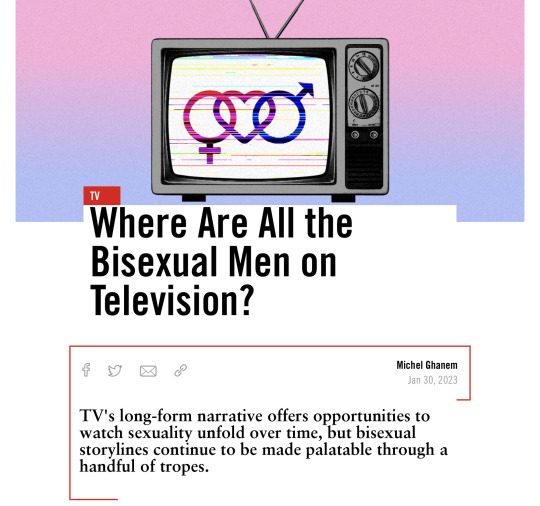
“I’m not even sure bisexuality exists. I think it’s just a layover on the way to Gaytown,” Carrie Bradshaw famously said in the offensive, misinformed 1998 episode of Sex and the City in which she dates a bisexual man. These words are still painfully seared into my brain. How could a sex columnist, a character written predominantly by gay men, have such a limited view of queer identity? Nearly ten years later, a 2016 episode of HBO dramedy Insecure sees Molly (Yvonne Orji) finding out that the man she’s seeing, Jared, nonchalantly had a sexual encounter with another man. After exposing her biphobia to her friends, another character declares Jared to be gay. Ultimately, Molly and Carrie both decide, despite the chemistry and their attraction, that they could not get past their own compulsory monosexuality to continue dating a bisexual man. Why does television, a medium primed for long-form character development and storytelling, continuously fail at representing bisexual men?
Twenty-five years after that infamous Sex and the City scene, bisexuality (for the purposes of this piece, I am using bisexuality as a term that encompasses all people with the capacity to be attracted to more than one gender, including those who identify as bisexual, pansexual, fluid, queer, and more) on television has made significant strides—from young-adult programming like Euphoria, Riverdale, and Gossip Girl, to adult dramas like Game of Thrones, The Magicians, and obviously, The Bisexual. Bisexuality is no longer relegated to a very-special episode, and is slowly leaving the realm of bad, misinformed jokes. According to GLAAD’s 2021-2022 Where We Are on TV report, queer representation on television is at an all-time high. After two consecutive years of decreases, bisexual representation increased by one percent over last year: nine non-binary characters, 124 women, and sadly, only 50 men. Fifty may seem like a solid number at the outset, but consider the quality of these representations. Aside from a few stand-out examples, like Nick Nelson (Kit Connor) on Netflix’s much-loved Heartstopper, many are relegated to supporting and recurring characters, at best, and stuck in tropes, at worst.
Maria San Filippo is an associate professor at Emerson College whose research focuses on screen media’s intersections with gender and sexuality. In 2013, she published The B Word: Bisexuality in Contemporary Film and Television, a pathbreaking monograph on the state of bisexual representation in both mediums. “Bisexuality was only beginning to be central and recurring, rather than peripheral and episodically one-off or short-lived,” she said over email. “Bisexuality’s representational legibility has been expanded; it’s less easily deniable as ‘just a phase’ when bisexuality becomes an ongoing character trait.”
Broadly speaking, on-screen storytelling has struggled to construct bisexuality in ways that reach beyond the word landing at the butt of jokes or framed through the lens of disgust and abjection. Nowhere does it fail bisexuals more than television, a site of endless discursive possibilities. Television’s long-form narrative offers unique opportunities to watch sexuality unfold over time, but rather than exploring and showcasing every permutation of bisexuality, bi men on television are far and few between.
“Bi+ male representation has always been the biggest challenge,” San Filippo said. “Bisexuality threatens heteropatriarchy and phallic authority, and so must be hidden or, if acknowledged, desexualized and disparaged through mockery or else hypersexualized as in porn (and even then bisexuality is rebranded as ‘gay for pay’).” She said it’s not unlike the uncommon sight of male frontal nudity on screen, which she explores in her 2021 book, Provocauteurs and Provocations. “Dan Levy’s character David on Schitt’s Creek is one high-profile example of recurring, more nuanced male bi+ representation,” she said. “We need more.”
The phallic authority, as San Filippo calls it, is not as threatened when it comes to the representation of bisexual women characters, who were more than double as numerous in the 2021-2022 television season. Nate Shu, a bisexual comedian based in Boston who spoke with me over Zoom, suggests that feminist film theorist Laura Mulvey’s work on patriarchal ideologies in film still applies here. Mulvey’s seminal 1975 essay, “Visual Pleasure and Narrative Cinema,” uses a psychoanalytic lens to look at the way women have been depicted in film primarily for the pleasure of the male viewer. She coined this theory the male gaze.
“Lesbian and bisexual characters are more attainable when they’re female because there’s something for male viewers to hold on to,” he said. “A bisexual woman is still an attainable woman to a straight man, whereas a bisexual man is both a threat and an anomaly.”
These conventions are sewn into the fabric of on-screen storytelling, a part of the canon of cinema that queer storytellers are working hard to reform. But despite this hard work, bisexual stories are still too-often made palatable to viewers through a handful of storytelling tropes: the coming out story, reasserting the status quo of a relationship or identity, or hinting at a character’s dishonesty or shiftiness (it pains me to bring it up, but Frank Underwood on House of Cards is a great example here).
The CW’s 2015 musical-dramedy Crazy Ex-Girlfriend showcased one of the more fleshed-out bisexual men on television, Darryl Whitefeather, played by Peter Gardner. His unapologetic musical sequence on how he’s “Gettin’ Bi” was an audacious and refreshing moment for a middle-aged character embracing his sexuality—despite his entire storyline being framed around coming out. We tend to see these coming out narratives again and again, to the point where it begins to feel like viewer manipulation. The coming out scene will only lead to the catharsis of Heartbreaker-level tears if it feels earned through a character’s arc of self-suppression and pain. However, the gay blueprint has already been established, and thus the coming out story is relatable and palatable, rather than depicting a character already living their truth.
Shu, who identifies as bisexual and biracial for the sake of alliteration in his comedy (as opposed to pansexual, a term to which he more closely relates), asked me poignant questions: “What is queer representation? Having a character make an off-hand comment and it’s never acknowledged—that is a queer character, but it’s not a queer story.” His ideal bisexual representation allows characters to be authentic people living outside of constructed narratives that are more viewer-friendly like the coming out story. He could only name one example of an Asian bisexual character on television that he felt somewhat seen through—Magnus Bane, played by Harry Shum Jr. on the Freeform supernatural drama Shadowhunters. “It’s tough to get out of the boxes of what culture, film, and TV have defined for decades,” Shu said.
Marvel has been a site of critique around its inability to flesh out queer characters in an authentic way, awkwardly suggesting that all superheroes are heterosexual. The 2021 Disney+ series Loki made headlines for a 20-second scene where the titular character confirms his bisexuality after admitting he has been with princesses and princes in his past. This kind of casual bisexuality has become more commonplace in the streaming era, to the point of forgettability: Bill Pargrave on Killing Eve, playing Eve’s MI5 boss until he was eventually stabbed by murderess Villanelle, also identified as bisexual in a passing conversation. Other examples include Joe MacMillan (Lee Pace) on Halt and Catch Fire and the titular character (Tom Ellis) on Lucifer. Does the off-hand knowledge of a character’s sexual fluidity, without an in-depth exploration of his sexuality, qualify as queer representation? Perhaps a better question would be, does it make bisexual viewers feel seen and understood, and add to monosexual viewers’ understanding and empathy of bisexuality?
At the end of October 2022, Kit Connor came out as bisexual in a bitter tweet after months of being hounded and online bullied by Netflix Heartstopper fans, some of whom accused Connor of queerbaiting for playing a bisexual character. The fall-out made me wonder why any actor, let alone a bisexual actor who may still be processing or figuring out his sexuality, would want to play a bisexual character in the social media age. “I think some of you missed the point of the show. Bye,” his tweet read.
Not to center myself in the discourse, but I can’t help but wonder how a more thorough cultural understanding of bisexuality would impact my own dating life as a gay man, what the dating pool might look like if there was a more rigorous acceptance and visibility of bisexuality and fewer “discreet” men refusing to send you photos of their faces on dating apps with fear of being outed in their real life. The latest 2021 Census data coming out of the United Kingdom suggests there are currently nearly as many bisexual-identifying individuals as gay and lesbian survey respondents combined. These numbers feel hopeful, to me. Previous generations grew up dissatisfied by the range of representation on television, leading to iconic shows like Pose that shifted the course of television at the intersections of queerness and race. I can only imagine what the landscape will look like in 10, 20 years as the bisexual-identifying Gen Zs—the queerest generation yet—make their way into creative fields. We’ll have to watch and find out.
#bisexuality#bisexual community#lgbtq community#lgbtq#bi#support bisexuality#pride#bi tumblr#bisexuality is valid#lgbtq pride#bisexual#bi pride#bisexual nation#bisexual pride#bisexual education#bisexual youth#support bisexual people#bisexual men#respect bisexual people#bisexual rights#tv#bisexual representation#bisexual men exist#television#bisexual heart#heartstopper#nick nelson#Loki
81 notes
·
View notes
Text
The Get Down (2016)
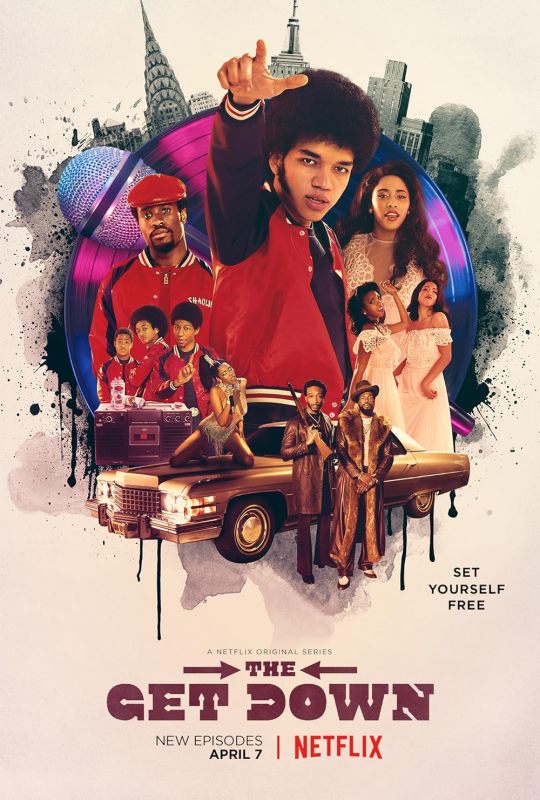
The Get Down is a television series created by Baz Luhrmann and Stephen Adly Guirgis. It premiered on Netflix in 2016 and consists of one season split into two parts. Set in the South Bronx in the late 1970s, the series explores the rise of hip-hop, disco, and punk music against the backdrop of a rapidly changing New York City.
The story follows a group of teenagers navigating the challenges of urban life while pursuing their dreams of music stardom. The main characters include Ezekiel "Zeke" Figuero, a talented poet and aspiring rapper; Mylene Cruz, a determined young singer with ambitions of becoming a disco star; Shaolin Fantastic, a streetwise graffiti artist and DJ; and other members of their diverse community.
The Get Down combines elements of drama, music, and historical fiction to depict the cultural and social dynamics of the era. The series is known for its vibrant visuals, dynamic musical performances, and engaging storytelling. It explores themes such as identity, ambition, love, and the power of art in the face of adversity.
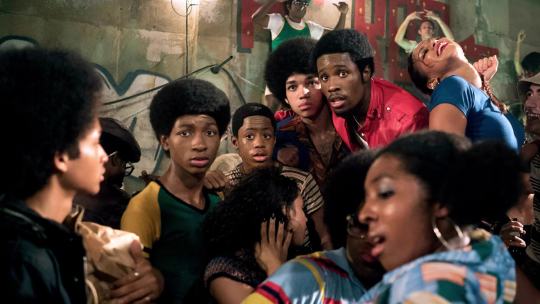
How does the series use dual-focus narrative as a strategic storytelling tool beyond heteronormative romantic pairings?
The Get Down employs a dual-focus narrative to delve into multiple layers of its characters' lives and the broader socio-cultural context of 1970s New York City. Beyond heteronormative romantic pairings, the series strategically utilizes this narrative tool to explore themes of identity, ambition, and social change. By intertwining the personal journeys of characters like Ezekiel and Mylene with the larger backdrop of the emerging hip-hop and disco scenes, the show creates a rich tapestry of interconnected stories that reflect the diversity of experiences within the community.
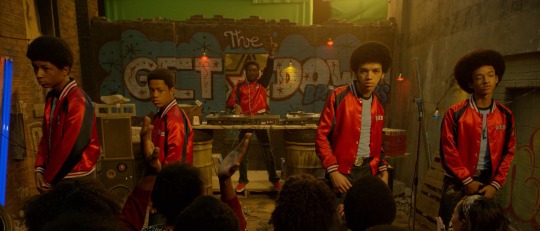
What are the “inevitable” couplings within the series and how are they accentuated through “cinematic” similarities and contrasts?
In terms of "inevitable" couplings, the series accentuates various relationships through cinematic similarities and contrasts. For example, the bond between Ezekiel and Shaolin Fantastic is portrayed with dynamic energy and shared passion for music and creativity. Their partnership is contrasted with the more traditional romantic coupling of Mylene and Zeke, highlighting the different forms of love and connection present within the narrative. Through visual motifs, such as parallel editing and juxtaposition of scenes, the series emphasizes the complexity of these relationships and their impact on the characters' lives.

How does the series use musical numbers within and beyond the narrative world to replicate fairy tale, backstage, or folk musicals?
Musical numbers in The Get Down serve as more than just performances within the narrative world; they replicate elements of fairy tales, backstage dramas, and folk musicals to enhance the storytelling experience. The use of music as a narrative device allows the show to explore themes of dreams, aspirations, and resilience in the face of adversity. Whether it's through elaborate dance sequences or heartfelt musical performances, these moments transport viewers into the characters' inner worlds, providing insight into their hopes, fears, and desires. By blending elements of fantasy and reality, The Get Down creates a unique and immersive musical experience that transcends traditional storytelling conventions.
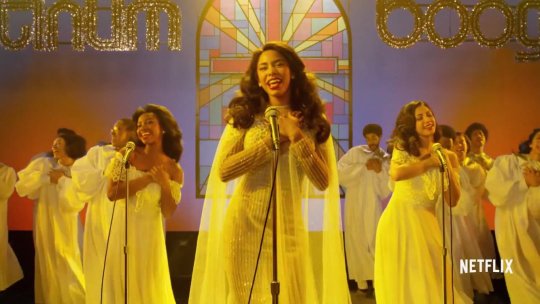
Overall, The Get Down was an amazing show that was gone too soon.<3
11 notes
·
View notes
Note
Would you ever write post coyote’s song? Animal fantasy road trips are 😩👌
@outpost51
Man I fucking love Coyote Song, it's sooo pretentious but also 100% me being the most on my bullshit I've ever been and I want to do it justice. I do kind of waver between leaving it as it is (just…animals) or switching it to the more anthropomorphic animals that are in Redwall or Mistmantle or what have you. Admittedly having them just be animals makes more sense, which is why I wrote it that way in the first place, but it might have a slightly wider appeal if they were anthropomorphic.
One thing I do want to do though, because it's primarily about storytelling, is have multiple different artists that I work with to illustrate different stories from different areas. So it would be a whole production.
It is a fully completed draft, although I have never edited or rewritten it (and it was written in 2016 lmao). But just for you, this is the opening!
Some coyotes say that Sanidor El-Adiel is the bravest coyote who ever lived. They howl praises to the moons about how he fought King Wolf, outwitted King Bear, outran King Puma, and nearly managed to steal the sun.
They say that if you look at his grizzled form you can still see the claw and fang marks left by King Wolf. You can still see the burned and blackened fur around his muzzle where he tried to grip the stem of the sun.
Out of all the coyotes singing his songs, Sanidor is the worst of them all. He never tries to be humble and the scope of his exploits grows each time he tells his tales. Young coyotes idolize him, but the bards despise him and the lies he spins – lies which only serve to keep the coyotes in the dark.
Of those who sing the true histories of the coyotes, not one believes that Sanidor was ever close enough to touch the sun.
~writer would you ever~
10 notes
·
View notes